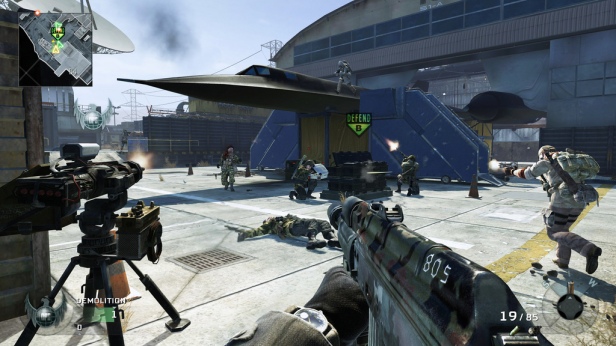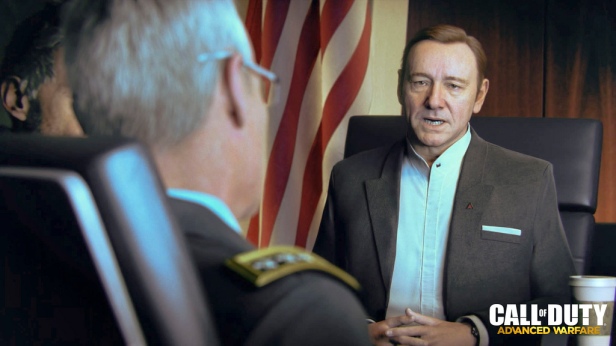Call of Duty is one of the profitable video game franchises of all time, but even it’s biggest fans and most ardent defenders can’t claim that the franchise, particularly it’s recent near-future titles, are serious and thoughtful games. I don’t say this as an insult mind you. 1985’s Commando is a film I have particular fondness in part because it doesn’t go into contemplative rabbit hole adventures into say, the troubled relationship between the USA and Latin America, get in way of the pun-spewing, man-mountain Colonel Matrix’s quest to rescue his daughter from a former dictator.
Arguably since the series’ inception, Call of Duty games can be described as romps. Fast-paced, twitch-shooting multiplayer complimented by bombastic, slick and action-packed single-player campaigns has done well by the series, providing millions of players around the world with video games where they can kick back, put their brains on auto-pilot and enjoy a few hours of carefree, simulated violence.

Despite this general consensus that Call of Duty is a ‘dumb’ franchise, those who take a particular interest in Call of Duty’s single player campaigns can’t help but wonder whether it’s various developers purposefully earned this reputation. Call of Duty’s single-player certainly doesn’t shy away from brutal violence and atrocity as most clearly evidenced in Call of Duty: Modern Warfare 2 where one mission sees the player in the shoes of a undercover CIA agent participating in a false-flag massacre of innocent people at a Russian airport. Given the regularly over the top and nonsensical nature of Call of Duty, such episodes can be easily written off as attempts at shock value rather than any serious statement on the horrors of war, terrorism or any such other topic the games have explored.
When searching for intelligence and serious commentary in Call of Duty’s storytelling the best example would appear to be 2014’s Call of Duty: Advanced Warfare. The game’s story takes place in the near-future and centres around the world-domination ambitions of a vast private military contractor. Given the debate and controversy surrounding the increasing reliance on mercenaries by the US military, it is easy to interpret Advanced Warfare’s story as a warning against the continued empowerment and enrichment of military organisations loyal only to their own self-interest and ideology. Further credence is added to this by the fact that the game’s publisher Activation convinced Kevin Spacey to bring his considerable acting talents, gravitas and menace to the role of the PMC’s CEO.

In the lead-up to the release of the latest Call of Duty title, Call of Duty: WW2, a game which returns to the franchise’s Second World War roots. There was seemly an active effort by the game’s marketing to hype up the single player campaign. It seemed to promise a more intelligent, character-driven experience in contrast to the historical precedent of playing a bland, tough guy soldier man going from place to places, blasting people in accordance with events going on around him.
These claims were giving some credence by the fact that the game’s developer, Sledgehammer Games, was the same developer that made the aforementioned advanced warfare. Sledgehammer also seemed to suggest that the traditional game mechanics of the Call of Duty games would be changed in aid of allowing the player to immerse themselves in a deeper and more realistic world. Specifically, the passive-health regeneration would be done away with to make the player feel less like a super-soldier.
(Possible spoilers beyond this point)
This new story is still very much a Call of Duty story of martial heroism, but while the previous games generally had their heroism nearly exclusively take the form of single-handedly slaughtering hundreds of enemy soldiers or foiling plots of mass murder or world domination, WW2 also involves the player engaging in acts of minor, human heroism. At numerous points in the game the player is prompted to perform heroic acts such as taking enemies prisoner rather than shooting them out of convenience or dragging wounded comrades out of the line of fire. These are nice touches that compliment the more down to earth primary protagonist of this game, assuming the player doesn’t mind going out of their way to do them. There is certainly the possibility for quite jarring dissonance between the protagonist during gameplay and in cutscenes should the player be more unskilled, bloodthirsty or apathetic in their style of play.
The main character Private Daniels does serve as an effective protagonist for the game. While fairly two-dimensional in nature, he is endearingly good-natured and compassionate without sacrificing the badassery required in such a character. A section where Daniels finds himself unarmed, shepherding a young German girl to safety during a battle is a genuinely tender character moment that is almost unique within the franchise. Attempts to explore and flesh out Daniel’s psyche and motivations through flashbacks and visions during his moments of stress ultimately fall flat however.

As for the promise of a great diversity of characters aside from the white males that had traditionally dominated the franchise, on a number of occasions you play members of the game’s side-cast, namely a female fighter in the French Resistance and a Hispanic-American tank commander. An African-American soldier also makes an appearance later in the game. Ultimately these ‘diversity’ characters are quite minor, complimented by a few snappy lines of dialogue before focus returns to the central cast.
The German antagonists by and large continue to take the form of hordes of cannon fodder for the player to blast their way through. While playing as the resistance fighter you do receive assistance from a German traitor but his reasons for helping the resistance are never explained. As for engaging villainy, standard Nazi villainy is common throughout the game, disregard for civilians, executing prisoners and so on. The Holocaust is revealed in a manner very reminiscent of Band of Brothers, but is light on the shock and horror shown by the characters. As for prominent villains, the ruthless Polizeifuhrer Heinrich encountered early in the game does stand out. Clearly heavily inspired by the character of Hans Landa from Inglourious Basterds, he is genuinely menacing in the scene in which you encounter him, if disappointingly short-lived.

The first centre-piece of the story, the comradeship between Private Daniels and his squadmates, most notably the Jewish-German Private Zussman, ultimately work well enough, but ultimately only a handful of squad members truly stand out and are memorable. This led to some awkward moments for me when named characters bit the dust and I found myself unable to remember a single character trait they possessed. Ultimately the strong theme of brotherhood does lead to a satisfying, if somewhat cliche ending.
The second centre-piece, the Platoon-esque rivalry between Lieutenant Turner and Sergeant Pierson alluded to before the release ultimately proves underwhelming. Early in the game, the tension between the two is communicated more by the protagonist’s narration than any actual animosity between the two and it is only when Pierson countermands Turner and leads a costly assault in the second half of the game does their animosity become serious. Their ideological difference of mission over man or man over mission never reaches any dramatics heights however, serving more as a point of underlying tension than a driving factor in the story. Pierson ultimately ends up becoming the more interesting of the two characters, in part due to a minor twist reveal near the end of the game, but in the grand scheme of things he ultimately falls into an unfortunate middle ground where he never assumes the mantle of a compelling or menacing villain, but is never particularly likeable or sympathetic either until the end of the game, making his quasi-redemption have limited impact.

All in all, for a franchise that has had such shocking terrible single player experiences as that found in Call of Duty: Ghost, Call of Duty: WW2 boasts a robust and enjoyable single-player story. Video games, even video games principally structured around action are perfectly capable of achieving marvels of story-telling, as evidenced by 2012’s Spec Ops: The Line, but I ultimately fear that Call of Duty’s ability to do good story-telling is constrained by where it finds itself in the market. No manner how talents the writers, how convincing the voice actors, how skilled the animators and how committed the team as a whole, Call of Duty games don’t sell off the back of promises of engaging story-telling, they sell of the back of their fun and intuitive multiplayer and the grand, chaotic, adrenaline-pumping set pieces’ of it’s single-player.
Call of Duty: WW2 is set to deliver on both counts and for somebody looking for yet another Call of Duty single-player romp, you will be very happy with the quality of this game. For those coming into the game having hyped yourself up for some kind of renaissance in Call of Duty’s approach to it’s single-player, prepare to be disappointed. It’s still far more Snyder or Bay than Spielberg or Stone, but I would be lying if it still isn’t a fun ride.
